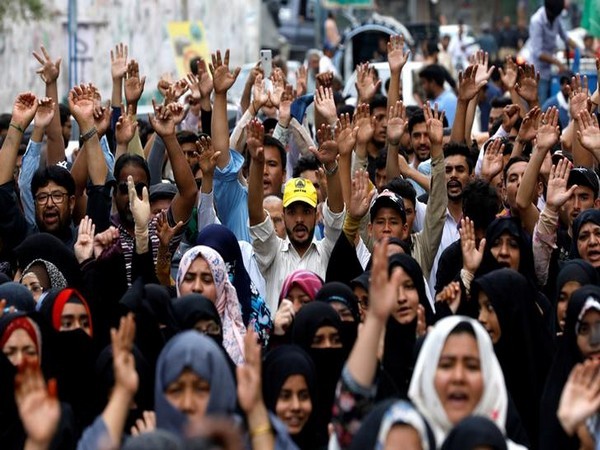
Pakistani Shi'ite supporters of Imamia Students Organization (ISO) rise their hands as they chant slogans to condemn the Friday's blast at vegetable market in Quetta, during a protest in Karachi, Pakistan April 14, 2019. REUTERS/Akhtar Soomro
On the night of 25th July, 2022, protesters from Rawalakot, in Pakistan occupied Jammu & Kashmir were shelled with bullets for raising their voice against the cruel imposition of taxes on electricity bills. This event has left dozens of demonstrators injured, five policemen shot and one in a critical condition.
Citizens are holding these protests to express their anger against load shedding in the area. What was earlier a problem of power crisis, later turned into a crisis of looting of public’s hard earned money by the government.
How the events unfolded:
People are facing massive power cuts in different parts of Pakistan- occupied Jammu and Kashmir. This load shedding goes on for about 18 hours a day. In view of the problems of the people, the National Students Union organized a protest on 5 July 2022.
When news was received about the NSF’s plan to hold protests, the police arrested the leaders – Abiba Jameel and her sister Kanwal – on July 4, a day before the protest. Despite both Abiba and Kanwal being women, they were not arrested by the female constable, but were forcefully detained by the male constable.
Even after the arrest, the protest continued as per the schedule. As a result, the government reduced the duration of power cuts by a few hours only in some areas of Pakistan occupied Jammu and Kashmir, but this was a momentary respite. The Prime Minister of Pakistan occupied Jammu and Kashmir, Tanveer Ilyas, announced in one of his press releases that the government would exclude ‘fuel adjustment surcharge’ from the bill. People thought this move would improve their condition, but it turned out to be their worst nightmare. The next month, when citizens received their electricity bills, they learned that they had been levied brutally high taxes. There was an outcry in the state, one made a statement that when his light bill was only Rs. 500, why the tax levied on it is (approx.) Rs.1300-1400. A businessman told that his light bill was Rs. 8000 and when the tax was added the total bill became Rs 20,000 (approx.).
Atrocities by the Government:
The government not only increased the tax but also extended the period of load shedding. Now it has increased from 18 hours a day to 20 hours a day. Imagine the impact these power cuts must have on the local people and the huge loss the business owners must be facing. Despite so much distress, no one came forward to talk to them or highlight their problems. Even media houses and journalist ignored this month-long protest. It shows how people are being suppressed by their own government.
In a small state with a population of 40 lakhs, the work of ministers has always been to seize institutions, promote nepotism, tribal and racial prejudices, build wealth in Punjab and loot the state exchequer.
Atrocities are happening in Pakistan occupied Kashmir since last many years. Pakistan occupied Jammu and Kashmir has independent government which is harassing its own people in the name of property tax, guardian, municipality, liberation cell etc. The activists of the area had been trying to stage the protest for a long time, but every time they were either harassed or threatened to silence their voices.
Unlawful arrest and cases of crime booked against Activists:
Continuing the fight to meet their basic needs, protesters from different parts of Pakistan occupied Jammu and Kashmir were arrested by the police. After this the Prime Minister announced that the people behind these protests are agents of RAW (India’s intelligence agency).
During the July 5th protest, people who were arrested included Union President (NSF) Samad Shakeel, Sagir Choudhary, Mohsin Aziz, Amir Imtiaz and several other NAP, NSF activists. They were later taken out of custody and the police moved them to Kohala, where there was a strict ban on their return to Muzaffarabad. Similarly, President (NAP) Sardar Liyaquat Hayat was also arrested from Rawalkot and later shifted to another place.
In another part of Pakistan occupied Jammu and Kashmir, the Awami Action Committee, which had begun protesting the demand for an end to the long period of power cuts, now began to protest for the release of their arrested brothers.
The Awami Action Committee called for a strike which was thwarted by the police force in Pak-Gali. The police lathi-charged the protesters, in which people were seriously injured. One person also lost his hand on the spot. The lathi charge was strongly condemned by the public.
Gun Abuse in Rawalkot:
During the 8-hour-long sit-in at Khad Rawalkot, the police tried to control the situation by lobbing tear gas, fired in the air to disperse the crowd. This move of the police only agitated the protesters, as a result of which they torched two police buses. Following this, the police retaliated by firing at the protesters, which soon turned into firing from both sides.
The state’s ignorant attitude towards police brutality and public cries further strengthened the stand of the protesters. They are continuing with protests in different parts of Pakistan occupied Jammu and Kashmir. On Tuesday 26 July, Awami Action Committees and political parties in Poonch went on strike against police violence and state terrorism.
Even after the situation has become so dire, the government is refusing to accept the demands of the people. It is the mismanagement, carelessness, arrogance and incompetence shown by the government to not budge from its decision that has resulted in increased tension in the region.






